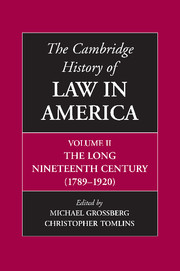Book contents
- Frontmatter
- 1 Law and the American State, from the Revolution to the Civil War: Institutional Growth and Structural Change
- 2 Legal Education and Legal Thought, 1790–1920
- 3 The Legal Profession: From the Revolution to the Civil War
- 4 The Courts, 1790–1920
- 5 Criminal Justice in the United States, 1790–1920: A Government of Laws or Men?
- 6 Citizenship And Immigration Law, 1800–1924: Resolutions Of Membership And Territory
- 7 Federal Policy, Western Movement, and Consequences for Indigenous People, 1790–1920
- 8 Marriage and Domestic Relations
- 9 Slavery, Anti-Slavery, and the Coming of the Civil War
- 10 The Civil War And Reconstruction
- 11 Law, Personhood, and Citizenship in the Long Nineteenth Century: the Borders of Belonging
- 12 Law in Popular Culture, 1790–1920: The People and the Law
- 13 Law and Religion, 1790–1920
- 14 Legal Innovation and Market Capitalism, 1790–1920
- 15 Innovations in Law and Technology, 1790–1920
- 16 The Laws of Industrial Organization, 1870–1920
- 17 The Military in American Legal History
- 18 The United States and International Affairs, 1789–1919
- 19 Politics, State-Building, and the Courts, 1870–1920
- Bibliographic Essays
- Notes on Contributors
- Index
- References
3 - The Legal Profession: From the Revolution to the Civil War
Published online by Cambridge University Press: 28 November 2008
- Frontmatter
- 1 Law and the American State, from the Revolution to the Civil War: Institutional Growth and Structural Change
- 2 Legal Education and Legal Thought, 1790–1920
- 3 The Legal Profession: From the Revolution to the Civil War
- 4 The Courts, 1790–1920
- 5 Criminal Justice in the United States, 1790–1920: A Government of Laws or Men?
- 6 Citizenship And Immigration Law, 1800–1924: Resolutions Of Membership And Territory
- 7 Federal Policy, Western Movement, and Consequences for Indigenous People, 1790–1920
- 8 Marriage and Domestic Relations
- 9 Slavery, Anti-Slavery, and the Coming of the Civil War
- 10 The Civil War And Reconstruction
- 11 Law, Personhood, and Citizenship in the Long Nineteenth Century: the Borders of Belonging
- 12 Law in Popular Culture, 1790–1920: The People and the Law
- 13 Law and Religion, 1790–1920
- 14 Legal Innovation and Market Capitalism, 1790–1920
- 15 Innovations in Law and Technology, 1790–1920
- 16 The Laws of Industrial Organization, 1870–1920
- 17 The Military in American Legal History
- 18 The United States and International Affairs, 1789–1919
- 19 Politics, State-Building, and the Courts, 1870–1920
- Bibliographic Essays
- Notes on Contributors
- Index
- References
Summary
The American legal profession matured and came to prominence during the century prior to the Civil War. The profession had entered the Revolutionary era in a somewhat ambiguous state, enjoying increasing social power and political leadership, but subject to withering criticism and suspicion. Its political influence was clear: twenty-five of the fifty-six signers of the Declaration of Independence were trained in law; so were thirty-one of the fifty-five members of the Constitutional Convention in Philadelphia; so were ten of the First Congress’s twenty-five senators and seventeen of its sixty-five representatives. And yet, just three weeks after the signing of the Declaration of Independence, Timothy Dwight – Calvinist, grandson of Jonathan Edwards, soon to be staunch Federalist, tutor at Yale College and, within several decades, its president – delivered a commencement address in New Haven full of foreboding, particularly for those among the graduates who would choose the legal profession. What would await them? Little but “{t}hat meanness, that infernal knavery, which multiplies needless litigations, which retards the operation of justice, which, from court to court, upon the most trifling pretences, postpones trial to glean the last emptyings of a client’s pocket, for unjust fees of everlasting attendance, which artfully twists the meaning of law to the side we espouse, which seizes unwarrantable advantages from the prepossessions, ignorance, interests and prejudices of a jury, you will shun rather than death or infamy.” Dwight prayed that, notwithstanding, “{y}our reasonings will be ever fair and open; your constructions of law candid, your endeavors to procure equitable decisions unremitted.”
- Type
- Chapter
- Information
- The Cambridge History of Law in America , pp. 68 - 105Publisher: Cambridge University PressPrint publication year: 2008
References
- 3
- Cited by

